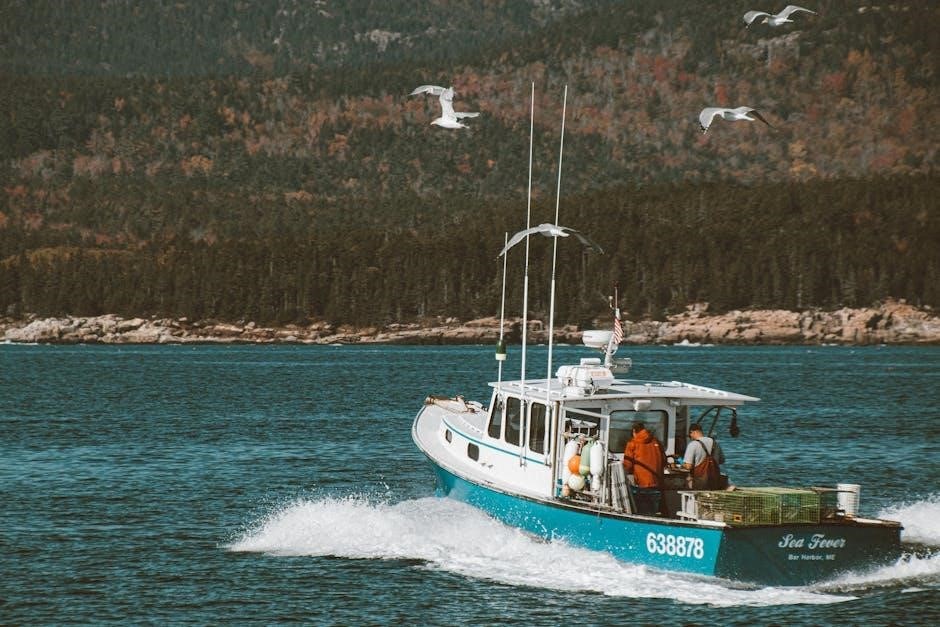Maine fly fishing guides offer expert knowledge of local waters, ensuring anglers enjoy memorable experiences. With deep understanding of trout, salmon, and other species’ habitats, they provide tailored trips for all skill levels, making every fishing adventure unforgettable in Maine’s pristine waters.
Overview of Maine’s Fly Fishing Scene
Maine’s fly fishing scene is renowned for its pristine rivers, lakes, and abundant trout and salmon populations. With diverse habitats, from fast-moving streams to calm lakes, anglers find endless opportunities. The state’s rugged beauty and wildlife-rich waters attract both novice and experienced fly fishermen. Local guides play a crucial role in enhancing the experience, offering insights into prime locations, seasonal patterns, and effective techniques tailored to Maine’s unique fishing conditions and species behavior.
Why Hire a Fly Fishing Guide in Maine
Hiring a fly fishing guide in Maine ensures a tailored and enriching experience. Guides offer expert local knowledge, accessing remote spots and secret fishing holes. They provide safety, instruction, and insights into seasonal patterns and ideal flies. Whether you’re a novice or experienced angler, guides enhance your trip with personalized strategies, ensuring a memorable and productive adventure on Maine’s iconic waters.
Popular Fly Fishing Locations in Maine
Maine is renowned for its exceptional fly fishing spots, including the Androscoggin River and numerous lakes. These waters are famed for brook trout and landlocked salmon, offering diverse fishing experiences across the state’s pristine landscapes;
Top Rivers and Streams for Trout and Salmon
Maine’s rivers and streams are a paradise for trout and salmon enthusiasts. The Androscoggin River, known for its brook trout and landlocked salmon, offers exceptional fly fishing opportunities. Other notable rivers include the Penobscot, Kennebec, and Allagash, each providing diverse habitats and challenging fishing conditions. Guides expertly navigate these waters, ensuring anglers target prime locations for both wild and stocked fish, making Maine a premier destination for fly fishing adventures year-round.
Best Lakes for Fly Fishing in Maine
Maine’s lakes offer exceptional fly fishing opportunities, with Belgrade Lakes and Moosehead Lake being top destinations. These waters are renowned for their brook trout, landlocked salmon, and splake populations. Sebago Lake, the state’s deepest, is another hotspot, offering trophy-sized fish. Guides often recommend Chamberlain Lake for its remote, pristine conditions and abundant wildlife. Maine’s lakes provide diverse fishing experiences, from shallow coves to deep structures, catering to both novice and experienced anglers seeking memorable catches.
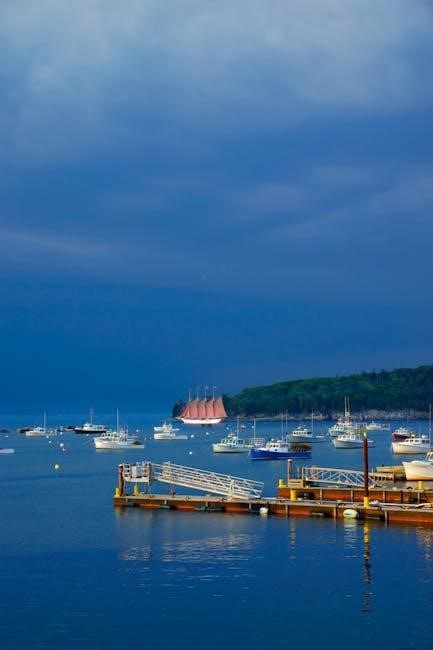
When to Go Fly Fishing in Maine
Maine’s fly fishing season runs from April to October, with prime trout fishing in May and June. Warm weather in July and August, and salmon in September.
Best Seasons for Fly Fishing
The best seasons for fly fishing in Maine are spring, summer, and fall. Spring offers excellent brook trout fishing, while summer brings warm-water species like smallmouth bass. Fall provides ideal conditions for salmon and trout, with cool waters and abundant hatches. Each season offers unique opportunities, ensuring year-round fishing experiences in Maine’s diverse waters.
Peak Fishing Times and Weather Conditions
Peak fishing times in Maine occur during early morning and late evening when fish are most active. Weather conditions like overcast skies and moderate temperatures enhance fishing success. Calm waters and gentle breezes improve casting accuracy. Seasonal changes bring specific hatches, making timing crucial. Local guides often track these conditions, helping anglers choose the best moments to cast their lines for a productive and enjoyable experience.
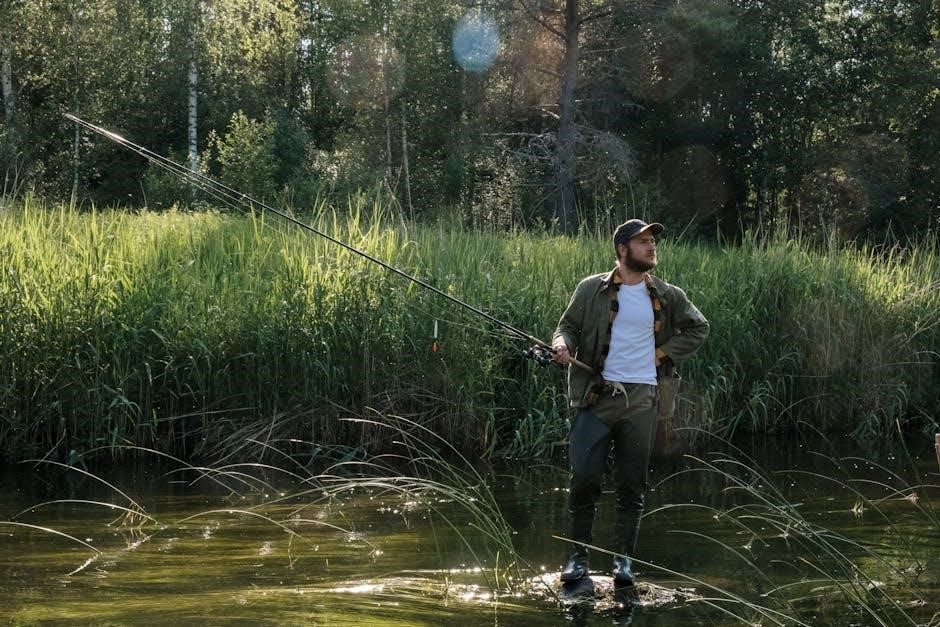
Essential Gear and Equipment
Quality fly rods, reels, and lines are vital for Maine fly fishing. Leaders, tippet, and a variety of flies tailored to local species ensure success. Waders and a well-stocked fly box are must-haves for any angler.
Recommended Fly Rods and Reels for Maine Waters
For Maine’s diverse fly fishing conditions, a 5-8 weight fly rod is ideal for targeting species like brook trout and salmon. Reels should have a reliable drag system and enough capacity for backing. Look for durable, corrosion-resistant equipment to withstand rugged environments. A balanced setup ensures smooth casting and handling of larger fish, making your angling experience more efficient and enjoyable in Maine’s pristine waters.
Best Flies for Maine’s Trout and Salmon
Popular flies for Maine include nymphs like the Hare’s Ear and Pheasant Tail, streamers such as the Muddler Minnow, and dry flies like the Elk Hair Caddis. For salmon, try large streamers or egg patterns. Squirmies and mop flies are also effective, especially in deeper waters. Match your fly selection to the season and water conditions to maximize success in Maine’s diverse fishery.
Techniques and Strategies
Maine fly fishing guides teach effective techniques like nymphing, streamer casting, and dry fly presentation. They adapt strategies to water conditions and fish behavior, ensuring success.
Beginner Tips for Fly Fishing in Maine
Beginners should start by choosing the right gear and learning basic casting techniques. Guides often recommend starting in calm waters to practice line control. Wading safely is crucial, as Maine rivers can be slippery. Focus on matching the hatch with flies that mimic local insects. Patience is key, as trout and salmon can be selective. Guides can provide personalized instruction to help novices build confidence and skills quickly.
Advanced Strategies for Experienced Anglers
Experienced anglers in Maine can refine their techniques by focusing on stealthy approaches and precise fly selection. Varying line weights and drift techniques can target deeper or more cautious fish. Understanding insect hatches and matching the hatch effectively is critical. Seasoned guides often emphasize the importance of adaptability, encouraging anglers to experiment with different patterns and presentations. Advanced strategies also include navigating low-water conditions and leveraging structure for optimal results.
Regulations and Safety
Adhering to Maine’s fishing regulations is crucial for sustainability. Obtain necessary licenses and permits, and practice catch-and-release to conserve fish populations. Always follow safety guidelines for wading and boating to ensure a safe and enjoyable experience on Maine’s waters.
Fishing Licenses and Permits Required
Fishing in Maine requires a valid license, available to residents and non-residents. Specific permits may be needed for certain species or waters. Guides must hold special licenses to operate legally. Ensure compliance with state regulations to avoid penalties and support conservation efforts. Licenses can be obtained through the Maine Department of Inland Fisheries and Wildlife, either online or at local outlets, ensuring lawful and sustainable fishing practices.
Safety Guidelines for Wading and Boating
Safety is crucial when fly fishing in Maine. Always wear a properly fitted PFD while boating and use a wading staff for stability in currents. Check water levels and weather conditions before heading out. Avoid wading in slippery or fast-moving waters without proper footwear. Be aware of your surroundings and respect private property. Ensure your boat meets state safety regulations, and inform someone of your fishing plans and expected return time.
Choosing the Right Guide
Research guides with local expertise and excellent reviews. Ensure they offer tailored trips for your skill level and target species. Ask about their experience and certifications to ensure a safe, successful, and enjoyable fishing adventure in Maine.
Questions to Ask Before Booking a Guide
Ask about their experience with specific species and waterways, ensuring they align with your goals. Inquire about certifications, safety protocols, and emergency procedures. Verify their knowledge of local regulations and environmental practices. Discuss the structure of the trip, including gear provided and teaching methods if you’re a beginner. Ensure they tailor the experience to your skill level and preferences for a successful and enjoyable outing.
Reputable Guide Services in Maine
Maine boasts numerous reputable fly fishing guide services, many with decades of experience. Guides like Maine Fly Guide offer expert trips on rivers such as the Androscoggin and its tributaries. These services often emphasize sustainability and safety, providing tailored experiences for both novice and seasoned anglers. Researching reviews and asking for referrals can help ensure a high-quality, memorable fly fishing adventure in Maine’s pristine waters.
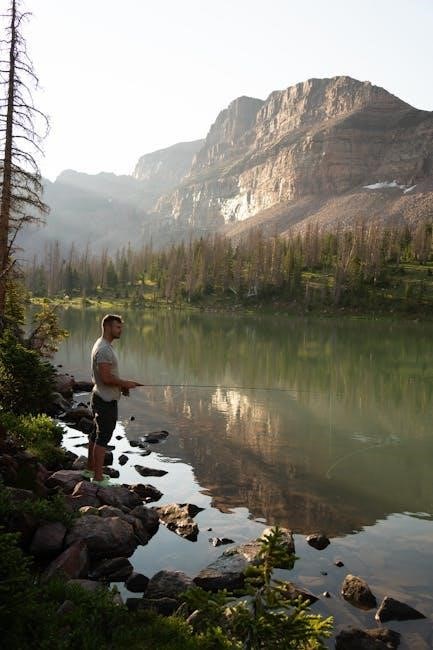
Conservation and Sustainability
Maine fly fishing guides prioritize conservation, promoting catch-and-release practices and sustainable fishing methods to protect trout and salmon populations. Many collaborate with local organizations to preserve habitats and ensure the longevity of Maine’s fisheries for future generations.
Catch-and-Release Practices
Catch-and-release fishing is a cornerstone of Maine’s conservation efforts. Guides emphasize handling fish gently, using barbless hooks, and minimizing air exposure to ensure survival. This practice helps maintain healthy trout and salmon populations, preserving Maine’s fisheries for future generations while promoting sustainable angling experiences.
Environmental Efforts in Maine’s Fisheries
Maine’s fisheries benefit from robust environmental initiatives aimed at preserving water quality and habitats. Guides often support conservation projects, such as river cleanups and habitat restoration, to protect trout and salmon populations. These efforts ensure sustainable fishing practices, maintaining Maine’s pristine ecosystems for future generations while promoting biodiversity and healthy fish populations in its iconic rivers and lakes.
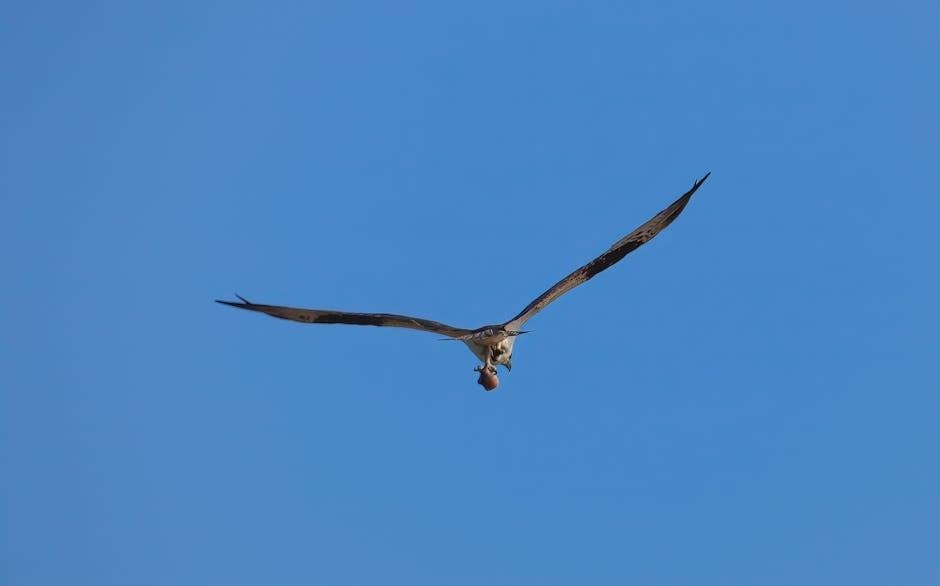
Planning Your Trip
Planning your trip involves booking a guided tour through reputable services, arranging accommodations, and preparing gear. Ensure licenses are secured and itineraries are tailored to your preferences.
How to Book a Guided Fly Fishing Trip
To book a guided fly fishing trip in Maine, start by researching reputable guides or services online, checking reviews, and asking for recommendations. Once you find a guide, contact them through their website or by phone to inquire about availability, typically providing details like your skill level and interests. Discuss the trip’s duration, location, and what’s included in the package. Ask about gear requirements and necessary licenses. Confirm the booking with a deposit and review their cancellation policies. Ensure all details are clear to enjoy a well-planned and memorable experience.
Accommodations and Local Amenities
Anglers visiting Maine for fly fishing can choose from a variety of accommodations, including cozy lodges, riverside cabins, and charming bed-and-breakfasts, many located near prime fishing spots. Local amenities often include tackle shops, restaurants serving fresh seafood, and outdoor gear stores. Some guides partner with local lodgings to offer package deals, combining lodging with guided trips. Be sure to book accommodations in advance, especially during peak fishing seasons, to secure convenient access to your fishing destinations.
